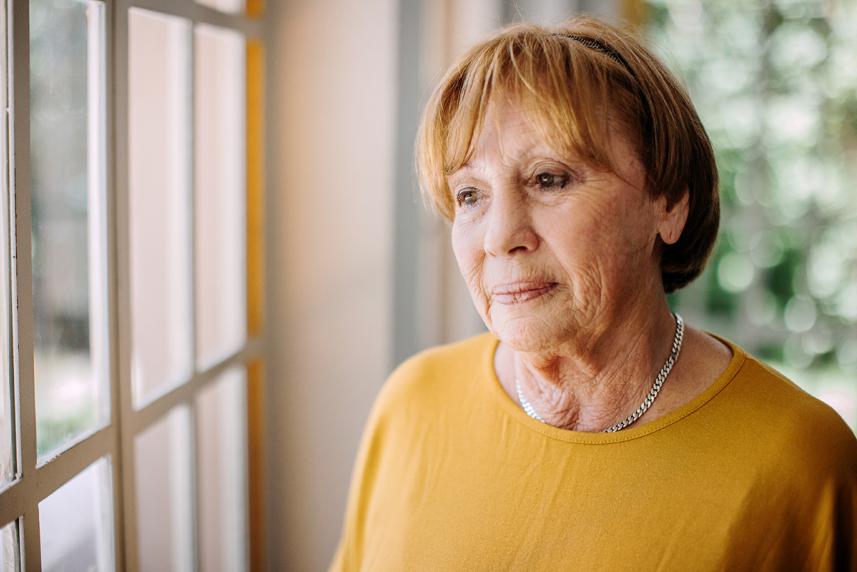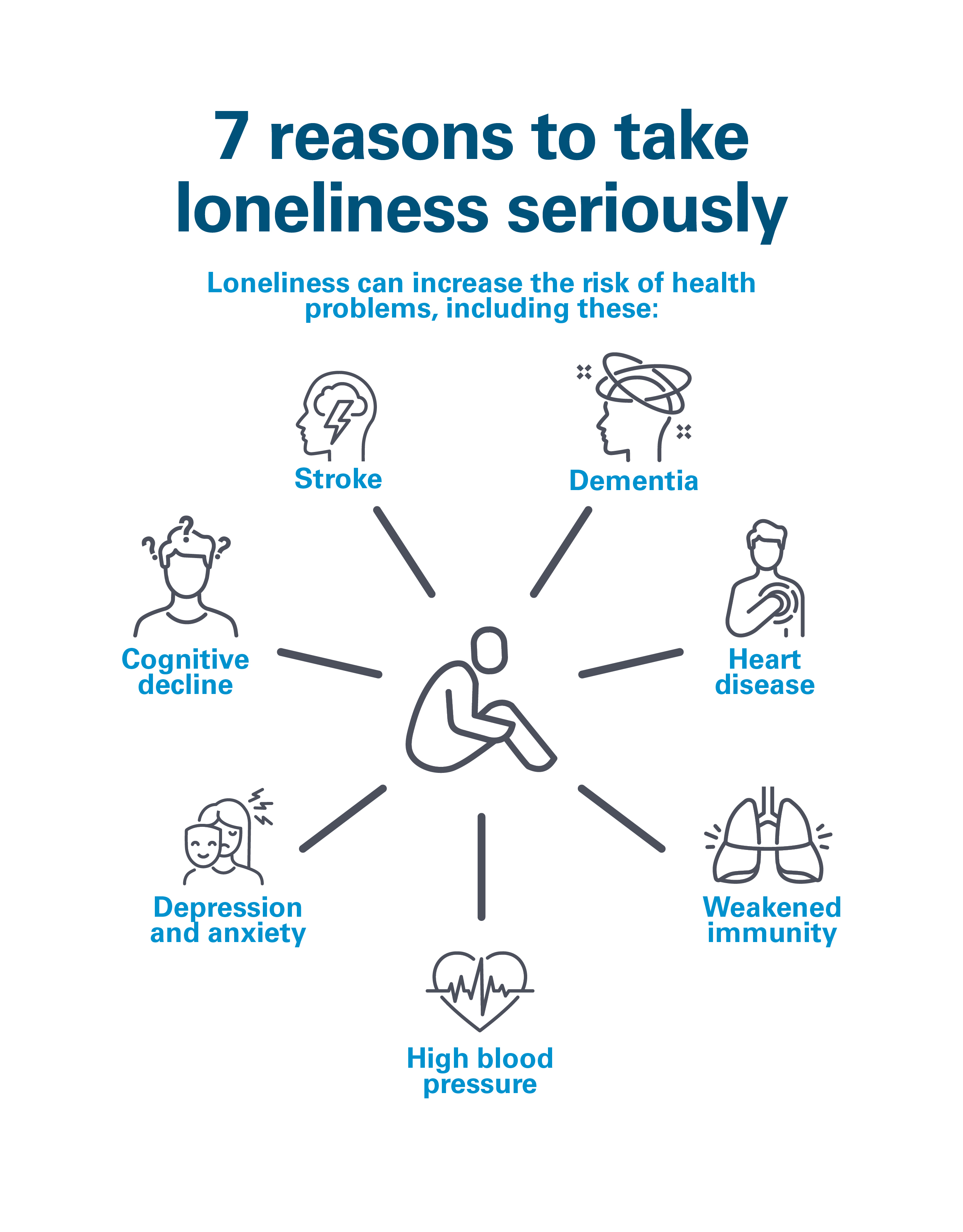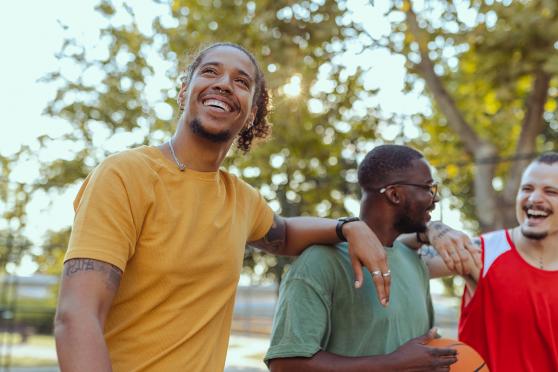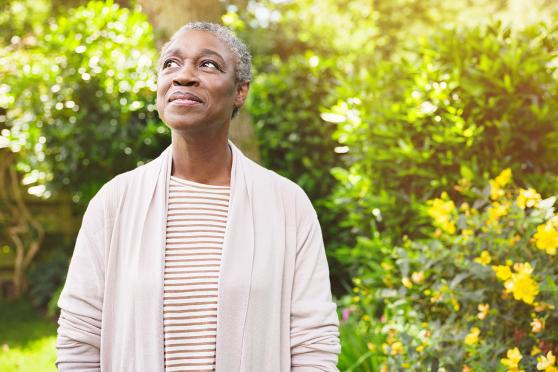What loneliness looks like in older adults — and how to help
Feeling connected is good for the mind and body. But loneliness can lead to health problems. Here's how to help an older loved one who is feeling lonely.

People need people. This may be a cliché, but it’s true. Our desire for connection is as much a part of our DNA as the color of our hair or the shape of our eyes. Friends and community give us energy and purpose.
Loneliness and social isolation, on the other hand, can leave us feeling drained. It can even harm your physical and mental health. Research has shown that loneliness may boost your chances of heart disease and inflammation. It can also lead to anxiety, depression, and cognitive issues.
Unfortunately, older adults are more likely to feel lonely than younger people. They may find themselves living alone due to the death of a partner. Illness or loss of mobility may keep them from socializing as often as they once did. Vision problems may prevent them from driving.
The good news? There are endless ways to stay connected — and when it comes to your loved ones, you can help. Learning how to spot the symptoms of loneliness in a loved one is the first step toward helping them feel more connected.
What’s the difference between loneliness and social isolation?
Though they may sound similar, loneliness and social isolation aren’t the same thing. Loneliness is the distressing feeling of being alone or separated, according to the National Institute on Aging. Social isolation is when you have few people you interact with regularly. In other words, loneliness is feeling alone, while social isolation is the state of physically being alone.
The two can be related, but someone can feel lonely even in a room full of people. Or they may not feel lonely, even though they live alone.
What are the health effects of loneliness in older adults?
Loneliness doesn’t just feel bad emotionally. It can affect physical health too. In fact, researchers say loneliness is as harmful to a person’s health and longevity as smoking, obesity, and physical inactivity, according to the American Heart Association.
How can I help an older loved one who is feeling lonely?
Certain health problems may contribute to loneliness and social isolation in older adults. You can help your loved one set up visits with their doctor to treat any underlying conditions.
You can also help your loved one maintain their existing relationships and make new connections. It may feel intimidating, but there are some simple ways to make new friendships, no matter their age.
Here are some strategies to consider.
1. Get their vision and hearing checked.
Two surprising risk factors for loneliness? Hearing and vision loss.
Researchers in a 2024 BMC Public Health study followed more than 5,000 adults ages 65 and older across an eight-year span. They found that older adults with self-reported hearing loss were more likely to have limited social participation. It makes sense: It’s hard to spend time with friends if you can’t hear what they’re saying.
The same goes for vision loss. In another recent study, older adults with vision problems or glaucoma reported that they were less likely to socialize with other people.
The good news? Hearing and vision loss may be treatable. You can help your loved one set up visits with an optometrist (eye doctor) and a hearing doctor, sometimes called an audiologist or an ENT (ear, nose, and throat doctor).
2. Help them find people with common interests.
Is there something your loved one is passionate about, such as bicycling, gardening, or going to the movies? Platforms like Meetup or Eventbrite help connect people with shared interests. You can also help them sign up for a class at their local library or community college.
Another solid meetup opportunity that will boost your physical health: fitness classes at your local gym. Check out fitness organizations specifically designed for older adults, such as SilverSneakers, to see what’s available in their area.
3. Make sure they’re taking care of their body.
It sounds simple, but it’s true: Eating well, getting enough sleep, and exercising regularly are keys to feeling better. When someone’s body is properly fueled, they’ll have more energy to maintain friendships and make new ones.
4. Encourage them to give back to their community.
Talk to your loved one about volunteering for local organizations looking for help. Having a sense of purpose and meaning can make people feel less alone, while being needed and appreciated can boost self-esteem.
To find volunteer work that matches their interests, search online for nonprofits near their home. Some areas have websites devoted to local volunteer opportunities. Another option is to check groups that support social or health causes. Look for opportunities on sites like UnitedWay.org or VolunteerMatch.org.
5. Help them come up with conversation starters.
Being physically isolated is an obvious reason for feeling lonely. But it’s common for people to feel disconnected and shy even when surrounded by people.
Sometimes, small talk can feel awkward or overwhelming. To get a conversation flowing, it’s important to be curious. You can help your loved one prepare some simple questions they can ask people when they go out. For example, they can ask about a recent sporting event or television show. These topics can help spark chitchat.
6. Help them stay connected to family.
Whether your loved one lives near or far, there are plenty of ways to connect. Try to visit them regularly if you live nearby. You can even schedule plans for the same day and time each week, like a standing lunch date on Friday afternoons. If you live far away, you can schedule regular video chats or surprise them with a letter in the mail.
It may take a bit of effort to make and maintain social connections as we age. But doing this can pay off in big ways — for your loved one’s physical and mental health.



